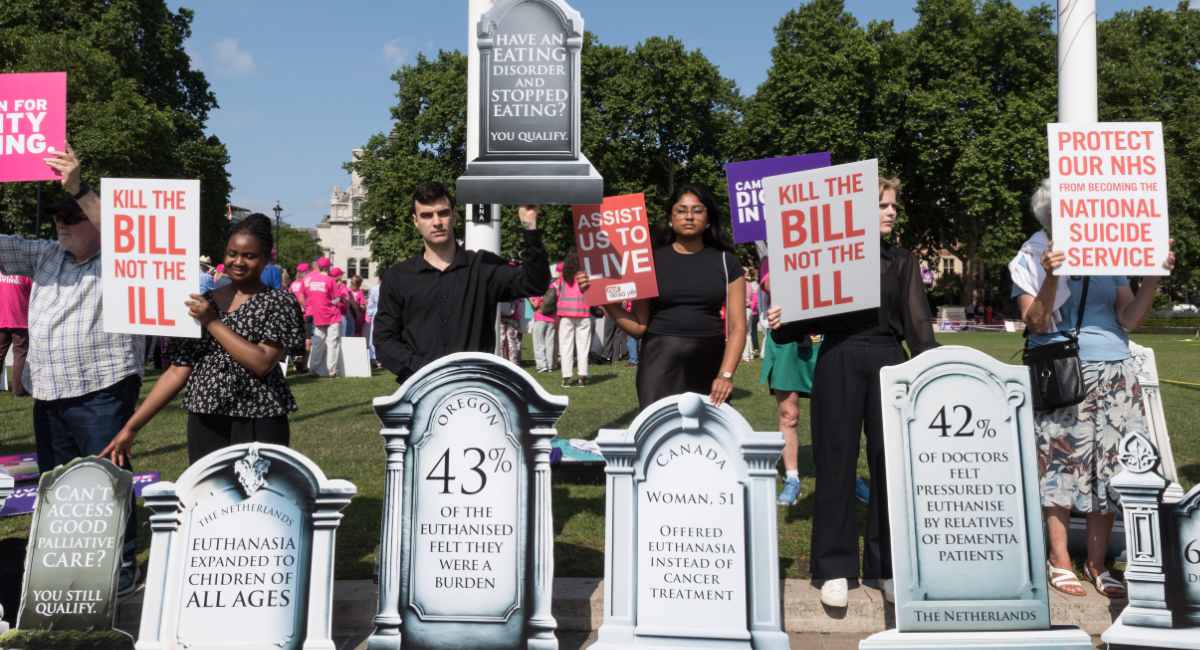The “Terminally Ill Adults (End of Life)” bill passed the UK Parliament (the House of Commons) on Friday, June 20, by a “significantly reduced margin of just 23 votes… (314 to 291), despite having passed its Second Reading with a 55-vote majority,” according to a press release from Right to Life UK.
The bill will now head to the House of Lords, where disability-rights groups and pro-life groups intend to continue their vigorous opposition.
Key Takeaways:
- The UK’s “Terminally Ill Adults (End of Life)” bill passed in Parliament on Friday by just 23 votes.
- The bill now proceeds to the House of Lords, and groups opposed to medically-assisted killing vow to do their best to fight against it’s full passage.
- Other countries that have passed such legislation have seen a rapid descent toward expanding access, removing safeguards, and even toward coercion of the most vulnerable.
- If fully passed, palliative care and real health care are likely to be deprioritized in the UK in favor of promoting death, as has also been seen in other countries like Canada.
Why It Matters:
Though many proponents of the bill claim to be motivated by compassion and a desire to end human suffering, all evidence to the contrary has seemingly been ignored, along with the main reasons why people seek ‘assisted dying’, as well as evidence of serious violations taking place where the practice has been legal for years. Even United Nations experts are concerned by the human rights abuses they have witnessed surrounding ‘assisted dying’ laws.
“A matter of life and death”
Reuters noted clearly in its report about the passage of the bill (emphases added):
Opponents had doubts not just about the potential for coercion, but also about the impact of assisted dying on the finances and resources of the state-run National Health Service, how the law might change the relationship between doctors and their patients and whether it could mean that improvements to palliative care might now not be made.
Care Not Killing in the UK pointed out that the bill had more safeguards when it was introduced last year that had already been eroded before Friday’s vote — and that this vote (similar to the abortion-to-birth amendment also passed by Parliament this week) was rushed through.
“Members of Parliament had under 10 hours to consider over 130 amendments to the Bill, or less than 5 minutes per change,” said the group’s CEO, Gordon Macdonald. “Does anyone think this is enough time to consider changes to a draft law that quite literally is a matter of life and death?”
Reuters notes that the group called the bill “deeply flawed and dangerous.”
Mike Smith, spokesperson for Not Dead Yet UK, reacted to the news in a press release:
This is not autonomy; it is a failure to protect those most at risk from societal pressure, isolation, and inadequate support. Legalising assisted dying for terminally ill people creates a lethal pathway where the ‘choice’ to die can become a duty for those who feel they are a burden.
Disabled lives are on the line.
Opponents are wise to have these concerns, as these very consequences have been seen in places with state-approved suicides and euthanasia, like Canada. Both the UK and Canada have government-run healthcare and have focused on the “cost savings” of killing over actual care.
The Slippery Slope
Not Dead Yet UK noted in its press release, “We will continue to present the overwhelming evidence from jurisdictions with similar laws, demonstrating the ‘slippery slope’ effect and the disproportionate impact on disabled, elderly, and socio-economically disadvantaged individuals” (emphasis added).
Canada is a clear example of what the “slippery slope” looks like. As noted by The Canadian Encyclopedia, things went south rather quickly in Canada after “medical assistance in dying” (MAiD) was allowed:
In 2015, after decades of various legal challenges, the Supreme Court of Canada decided unanimously to allow physician-assisted suicide.
In June 2016, the federal government passed the Medical Assistance in Dying (MAID) Act, which established the eligibility criteria and procedural safeguards for medically assisted suicide.
In March 2021, new legislation was passed that expanded eligibility for MAID.
Things to note:
- Canada’s timeline: it took just five years for the eligibility parameters on MAiD in Canada to be expanded to include more people than before.
- A detail left out of Canada’s timeline: A cost estimate report on Canada’s “medical assistance in dying” was submitted to Parliament in 2020 encouraging the expansion of MAiD access because it had already saved the country’s government nearly $87 million, and would “result in a net reduction in health care costs for the provincial governments.” And the very next year, Canada’s lawmakers expanded access to MAiD.
The Canadian government has even funded at least two groups exclusively dedicated to promoting and advocating for medicalized killing.
Saving money by ending lives
It seems Canada’s lawmakers received the message: Killing people saves money. And UK lawmakers likely received that message as well.
In May 2025, a cost assessment was ordered for the UK’s “Terminally Ill Adults (End of Life)” bill, estimating that the NHS could save $79 million every single year by legalizing medicalized killing. As Live Action News noted (emphases added):
… the very fact that such an assessment was sought — evaluating whether a human being should live or die based on monetary cost of death versus treatment/life — fuels the concerns of those opposed to the legislation….
Tanni Grey-Thompson, a Paralympian and member of the House of Lords, said, “This impact assessment highlights how assisted dying would put disabled and other vulnerable people at grave risk by providing financial incentives to an already overburdened and under-resourced NHS to offer assisted dying as a ‘treatment option’.”
Gordon Macdonald, chief executive of Care Not Killing, opposes the law and said the assessment “confirms that changing the law will save money … exactly as we have seen in other jurisdictions which have introduced state-assisted killing, placing pressure on vulnerable terminally ill people to end their lives.”
Coercion has become common where assisted dying is the order of the day, with people denied health care in favor of death as a “treatment.”
The grave is never satisfied
Today in Canada, the province of Quebec has become so pro-MAiD that medical professionals are now being reminded that they must facilitate requests for death. A recent memo from a medical group stated, “No healthcare professional can ignore a request for MAID. It is the responsibility of every professional to ensure that such a request is taken care of.”
If a professional has conscience objections, he or she must send the MAiD request to the “interdisciplinary support group” so that the request can still be facilitated by someone; the memo also notes that “no intimidation of anyone requesting information or an MAID, nor of the professionals involved, will be tolerated,” adding that any such incidents should be reported. As Live Action News notes:
The memo’s insistence that medical professionals facilitate all MAiD requests is alarming, especially considering that as of 2024, Quebec has the highest euthanasia rate in the world.
In 2023, the Quebec Commission on End-of-Life Care issued a warning that some of the province’s euthanasia deaths were not in compliance with the law. The commission felt compelled to send a memo reminding doctors that old age alone isn’t qualification for a MAID death, while reiterating that a second doctor must confirm the euthanasia request.
Despite these statistics, the province announced in 2024 that it is moving to allow euthanasia by “advance request” for people who are no longer able to give their consent.
Quebec is on a steep slide down the slippery slope, if its doctors there had to be reminded that they don’t just get to “release to Elsewhere” all the elderly individuals who feel they’re done living.
The Big Picture:
Last October, Right to Life UK reported that palliative care — real end-of-life care for those who are dying — may be deprioritized in favor of active killing, and palliative care doctors are concerned:
A survey of palliative care doctors who are members of the Association for Palliative Medicine found that 82% oppose the introduction of assisted suicide.
The results of the Association for Palliative Medicine survey have been mirrored in a more recent survey of doctors by the British Medical Association, which found that 83% of palliative care doctors oppose a change in the law to introduce assisted suicide, while only 6% supported such a change.
These are physicians who — unlike the general public — know every difference between palliative care and ‘assisted dying.’
The group’s honorary secretary, Dr Matthew Doré, rightly stated last year that laws “are more than rules – they send social messages,” and that this message is that “assisted dying, removing yourself from the picture, is what the state wants, and leaving palliative care to charity. The NHS is supposed to be ‘cradle to grave’, not ‘cradle to very old.’”
Hospice physicians have expressed similar concerns, and have asked why more resources have not been diverted to improved palliative care instead.
Not Dead Yet UK writes that, as the UK bill now heads to the House of Lords, they hope the Lords will seek out every possible avenue to mitigate the damage of the bill, and also “focus parliamentary energy and resources on guaranteeing universal access to high-quality palliative care, social care, mental health support, and financial aid – the real measures that provide dignity and choice at the end of life.”
Spokesperson Mike Smith added, “We call upon the House of Lords to act as the vital revising chamber it is meant to be. They must listen to the voices of disabled people whose lives are directly threatened by this legislation and act to protect them.”
Right to Life UK spokesperson Catherine Robinson said in the group’s press release:
Although the Bill passed the Commons today, momentum remains with its opponents, with support consistently falling every time MPs have considered it. The Bill leaves the Commons lacking a majority, with fewer than half of all MPs voting for it at its final stage.
We will be fighting this Bill at every stage in the House of Lords, where we are confident it can be overturned given its continued loss of support.
… We will be working together to ensure this Bill, which would have a profoundly negative impact on vulnerable people in our society, never becomes law.
The Bottom Line:
As Robinson summed up, it is our job to protect the most vulnerable — and this bill doesn’t.
“The most vulnerable in our society deserve our unwavering protection and the highest standard of care, not a pathway to assisted suicide,” she said. “Evidence from overseas shows that, if this legislation becomes law, countless vulnerable people nearing the end of life would be pressured or coerced into ending their lives.”








